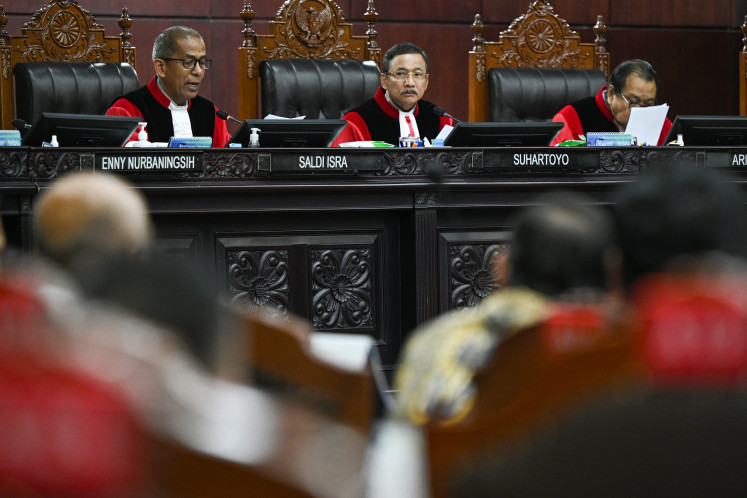Popular Reads
Top Results
Can't find what you're looking for?
View all search resultsPopular Reads
Top Results
Can't find what you're looking for?
View all search resultsFirst oil, now RI may become gas importer
Delays in a number of gas field development projects may result in imports being the only answer to growing need, a senior official at the Energy and Mineral Resources Ministry said
Change text size
Gift Premium Articles
to Anyone
D
elays in a number of gas field development projects may result in imports being the only answer to growing need, a senior official at the Energy and Mineral Resources Ministry said.
The program director for the ministry's oil and gas directorate general, Naryanto Wagimin, said in Jakarta on Wednesday that if there was no significant improvement to supply within the next few years, Indonesia, once the world's largest liquefied natural gas (LNG) producer, would become a net importer as of 2020.
Indonesia, former member of the Organization of Petroleum Exporting Countries (OPEC), has become a net oil importer due to a continued decline in oil production.
'Some projects are supposed to be delivering gas by that time. However, there are signs of delays. The gap between supply and demand will widen as Masela, Tangguh Train 3 and Indonesia Deepwater Development [IDD] are experiencing setbacks,' Naryanto said on the sidelines of the Indonesia Energy Forum on Wednesday.
The gas deficit is expected to hit 7,600 million standard cubic feet per day (mmscfd) by 2028, according to figures presented by Naryanto.
Domestic gas demand growth is around 4 percent, he said.
The country is estimated to have 104 trillion standard cubic feet (tscf) in proven and 48 tscf in potential gas reserves, making it the 13th largest owner of proven natural gas reserves in the world and the second-biggest in the Asia-Pacific region after China, according to the International Energy Agency.
Gas production in 2013 reached 6,869 mmscfd in 2013, of which 52 percent was sold overseas, according to figures from the Upstream Oil and Gas Regulatory Special Task Force (SKKMigas).
Given the expected lack of supply, companies, such as oil and gas giant PT Pertamina and Jakarta-listed gas distributor PT PGN, have been preparing to secure gas supplies from overseas.
Pertamina has signed an agreement with US-based Cheniere Energy Inc., related to supplies of LNG. Meanwhile, PGN recently said that it had purchased a stake in a shale gas field in the US.
Pertamina's director for gas, Hary Karyuliarto, said gas imports would be necessary as in the next five years gas production and infrastructure development would not be able to meet demand.
'If we cannot meet demand, there will be slower economic growth,' Hary said.
Diverting gas deliveries from expired contracts with overseas buyers to the domestic market will be an option to handle gas deficit, according to Naryanto. A number of gas-selling contracts with overseas buyers will expire within the next two years, he said.
However, poor infrastructure is the main hurdle to increasing deliveries to the domestic market.
The deputy minister for infrastructure affairs at the National Development Planning Board (Bappenas), Dedy Supriadi Priatna, said development of gas infrastructure in the country remained slow.
He cited that as of 2009, only two cities had household gas infrastructure. Currently 55 cities are hooked up but this is to expand to 100 cities next year, according to Dedy.
'During 2015-2019, under the mid-term development plan [RJPMN], we will accelerate programs so that there is more gas infrastructure,' he said.
Under the planned RJPMN, which Bappenas will propose to the government, the board is targeting to see 56 percent to 75 percent of gas used for the domestic market by 2019.










